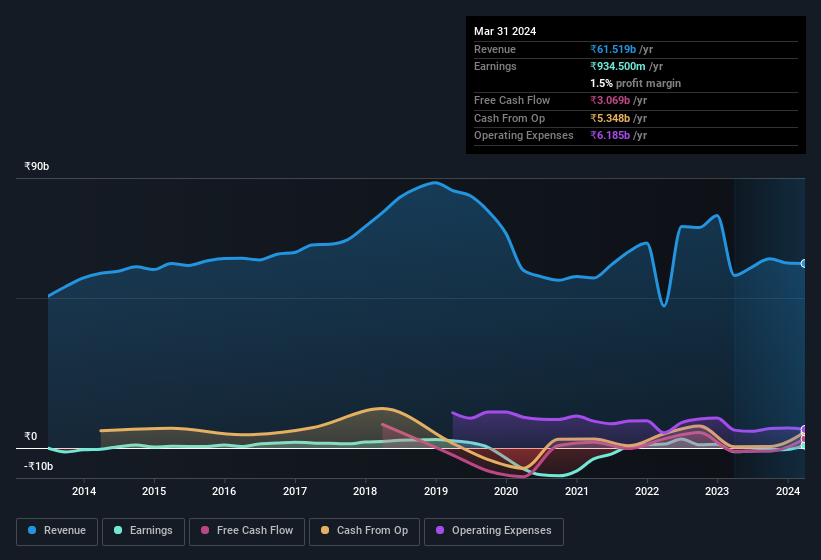Jain Irrigation Systems' (NSE:JISLDVREQS) Earnings Are Of Questionable Quality
Jain Irrigation Systems Limited (NSE:JISLDVREQS) announced strong profits, but the stock was stagnant. We did some digging, and we found some concerning factors in the details.
See our latest analysis for Jain Irrigation Systems

To understand the value of a company's earnings growth, it is imperative to consider any dilution of shareholders' interests. In fact, Jain Irrigation Systems increased the number of shares on issue by 9.9% over the last twelve months by issuing new shares. That means its earnings are split among a greater number of shares. To talk about net income, without noticing earnings per share, is to be distracted by the big numbers while ignoring the smaller numbers that talk to per share value. Check out Jain Irrigation Systems' historical EPS growth by clicking on this link.
How Is Dilution Impacting Jain Irrigation Systems' Earnings Per Share (EPS)?
Three years ago, Jain Irrigation Systems lost money. Zooming in to the last year, we still can't talk about growth rates coherently, since it made a loss last year. But mathematics aside, it is always good to see when a formerly unprofitable business come good (though we accept profit would have been higher if dilution had not been required). And so, you can see quite clearly that dilution is influencing shareholder earnings.
If Jain Irrigation Systems' EPS can grow over time then that drastically improves the chances of the share price moving in the same direction. However, if its profit increases while its earnings per share stay flat (or even fall) then shareholders might not see much benefit. For that reason, you could say that EPS is more important that net income in the long run, assuming the goal is to assess whether a company's share price might grow.
Note: we always recommend investors check balance sheet strength. Click here to be taken to our balance sheet analysis of Jain Irrigation Systems.
Our Take On Jain Irrigation Systems' Profit Performance
Over the last year Jain Irrigation Systems issued new shares and so, there's a noteworthy divergence between EPS and net income growth. Because of this, we think that it may be that Jain Irrigation Systems' statutory profits are better than its underlying earnings power. On the bright side, the company showed enough improvement to book a profit this year, after losing money last year. Of course, we've only just scratched the surface when it comes to analysing its earnings; one could also consider margins, forecast growth, and return on investment, among other factors. So if you'd like to dive deeper into this stock, it's crucial to consider any risks it's facing. Our analysis shows 3 warning signs for Jain Irrigation Systems (1 can't be ignored!) and we strongly recommend you look at these bad boys before investing.
Today we've zoomed in on a single data point to better understand the nature of Jain Irrigation Systems' profit. But there is always more to discover if you are capable of focussing your mind on minutiae. Some people consider a high return on equity to be a good sign of a quality business. While it might take a little research on your behalf, you may find this free collection of companies boasting high return on equity, or this list of stocks with significant insider holdings to be useful.
New: Manage All Your Stock Portfolios in One Place
We've created the ultimate portfolio companion for stock investors, and it's free.
• Connect an unlimited number of Portfolios and see your total in one currency
• Be alerted to new Warning Signs or Risks via email or mobile
• Track the Fair Value of your stocks
Have feedback on this article? Concerned about the content? Get in touch with us directly. Alternatively, email editorial-team (at) simplywallst.com.
This article by Simply Wall St is general in nature. We provide commentary based on historical data and analyst forecasts only using an unbiased methodology and our articles are not intended to be financial advice. It does not constitute a recommendation to buy or sell any stock, and does not take account of your objectives, or your financial situation. We aim to bring you long-term focused analysis driven by fundamental data. Note that our analysis may not factor in the latest price-sensitive company announcements or qualitative material. Simply Wall St has no position in any stocks mentioned.
About NSEI:JISLDVREQS
Jain Irrigation Systems
Manufactures and sells micro-irrigation systems in India, Europe, North America, and internationally.
Adequate balance sheet with low risk.
Market Insights
Community Narratives





